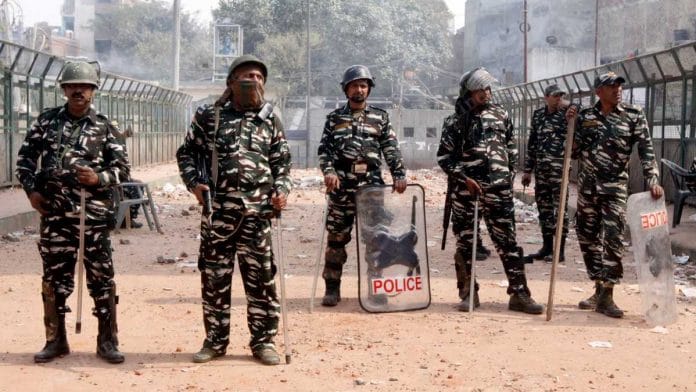New Delhi: One man, 10 cases and three police witnesses — this is the story of Neeraj (goes by his first name), who was arrested in connection with the Delhi riots that took place in February.
The Delhi Police has named Neeraj in 10 cases of rioting. And in all of these cases, only three policemen — two constables and one head constable — have been cited as witnesses.
If one goes by Delhi Police’s version, the policemen saw Neeraj — in jail since 9 April — damaging public property at 10 different locations in Bhajanpura.
A Delhi court has, however, thrashed the police’s theory to grant bail to Neeraj, on his furnishing a personal bond of Rs 20,000 for each of the cases. Additional Sessions Judge Vinod Yadav noted in all 10 orders — seen by ThePrint — that the statements of police witnesses was of no “consequence to the prosecution case”.
Among other things, the judge, in his orders, took note of the belated registration of FIRs and questioned the three policemen for not reporting the crimes on the days when they saw Neeraj committing them.
Judge Yadav also rejected the police’s argument against Neeraj’s release on the ground that he would threaten witnesses. The court said there were no independent witnesses to whom Neeraj can extend threats, if given bail.
Also read: Belated FIRs, planted witnesses — a look at Justice Kait’s bail orders in Delhi riots cases
The riots
The riots in Northeast Delhi had followed weeks of protests across the country against the controversial Citizenship Amendment Act (CAA). It left 53 dead and hundreds injured.
The Delhi Police is said to have registered 751 criminal cases against more than 1,000 people in connection with the week-long riots. Investigation into these cases was handed over to three departments within the Delhi Police.
While cases in which rioting and damage to properties were reported remained with the local police for investigation, the probe into incidents where charges of attempt to murder or murder were invoked was handed over to the crime branch.
Delhi Police’s Special Cell took charge of inquiry into the ‘larger conspiracy’ behind the riots, in which the department has filed a charge sheet against 14 people, including former JNU president Umar Khalid and former AAP councillor Tahir Hussain, under the stringent anti-terror law, the Unlawful Activities (Prevention) Act.
Accused is a ‘bad character’: Police
Apart from failing to produce independent witnesses, Judge Yadav noted, the police also did not place any electronic evidence before the court as supporting proof.
“There is nothing on record such as independent witnesses, CCTV footage or any video recording to show the presence of the applicant at the spot or that he was involved in rioting and chanting slogans against the other community,” read one of the bail orders, given on 10 October.
On 26 October, Judge Yadav gave bail to Neeraj in four cases through a common order. The order said identification of the accused by the policemen who were also the beat constables of the area, after a lapse of considerable time and in the absence of any material as to why they did not report the matter, and Neeraj’s presence at the spot on the date of the incident were doubtful.
To the police’s argument that Neeraj was a bad character in the area, the judge said, “The accused cannot be made to languish merely because he is a bad character.”
‘No connecting evidence against Neeraj except his statement’
The cases against Neeraj relate to incidents of rioting, arsoning, vandalism and destruction of properties reported on 24 and 25 February.
However, none of the FIRs were filed on the day of the incidents. They were filed more than a week later. In one case, an FIR was lodged 15 days after the alleged incident.
Neeraj, according to the police’s submission in the court, was arrested in all cases at the behest of a co-accused and “on secret information”. The police also alleged that Neeraj was “actively involved in the riots and chanting slogans against the other community”.
Judge Yadav observed in his orders that there was no evidence to connect Neeraj to the offences in the FIRs, except his own disclosure statement. Also, the judge noted, the accused was not specifically named by the complainants. Furthermore, the police effected no recovery from him, the court orders noted.
Also read: Delhi HC grants bail to Tahir Hussain aide in riots case, says witnesses ‘planted’







Biased investigation